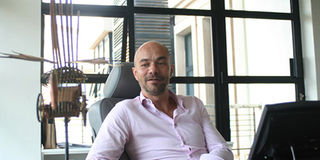Don’t they say work and no play makes us dull?

One Africa Media CEO Carey Eaton. Photo|PHOEBE OKALL
What you need to know:
- Employees here concur. They say that not only does the relaxed environment help relieve stress, it increases motivation and helps draw in new talent.
Colleagues go at each other in brief table tennis duels at one corner of the open floor. It’s about 11 am, and they have taken a slight break from work. There is a play-station too, and other types of games.
Downstairs, a bar is under construction. The compartment for the fridge seems set. Soon, the glasses will be clinking around here to break the monotony of work.
Such is the atmosphere at the One Africa Media (OAM) offices at the Grosvenor building just off Riverside Drive, Nairobi. In this work set-up, play and toil are not mutually exclusive. They happen about the same time, and are thought to complement each other.
Mr Carey Eaton, the CEO and one of the founders of OAM – a portfolio of online marketplaces focused on jobs, cars, property, leisure and travel – feels that a stifling work environment will only bring out the worst in people, hence his flexible attitude towards work.
Mr Eaton is taking me on a tour around the offices of the different subsidiary companies under OAM. They include Brighter Monday (job vacancies), Cheki.co.ke (car sales), Staynow (travel and hospitality) and BuyrentKenya (property).
Mr Eaton explains that having a job that takes up 10 hours a day of mind-numbing boredom almost always leads employees to look for diversions and distractions – anything to liven up their working day.
This, he says, is the reason he has incorporated play into work to provide a refreshing break. To him, play helps to reduce work pressure, and from his experience, ultimately results in higher performance.
The games do this by enhancing camaraderie at the workplace, adds Mr Eaton. The camaraderie quashes interpersonal inertia, encourages shared experiences, and helps employees to cross the social boundaries that ever so dutifully form at workplaces.
Relieve stress
Employees here concur. They say that not only does the relaxed environment help relieve stress, it increases motivation and helps draw in new talent. This view is offered by Robert Kimani, the sales director. He is at a dining table near the kitchen, with his team, having a cup of tea over some banter.
The culture here, he stresses, promotes innovation and collaboration. “Due to such informal meetings, great ideas have been born. People feel less under the magnifying glass when they interact informally, maybe over a game of table tennis. They are unconstrained, more confident, and self-assured.”
Maybe that is also the rationale behind the unique interior décor at this place. Some furniture is designed from scrap aircraft parts. The CEO’s table is one of them. His chair is crafted from a car seat.
You see many of such unusual designs around the OAM offices. If this place were to be summed up in two words, ‘playful’ would describe the ambiance and ‘flexibility’ the job processes.
The benefit of this kind of environment is supported by research, which confirms just how much happier people work harder.
In March, economists Andrew Oswald, Eugenio Proto, and Daniel Sgroi from the Department of Economics at the University of Warwick in the UK, carried out a number of experiments to test the extent to which employees worked harder if they were happy and relaxed. They found that happiness made people about 12 per cent more productive.
Thus, the increasing levels of flexibilities being offered in workplaces to varying degrees to make employees content have the backing of research.
Global trends indicate that people are happily embracing such developments as being enabled to work away from their usual stations. Employers are now dangling different kinds of flexibilities and removal of traditional workplace rigidities as attractions for talent.
Flexibility, which can be applied in different ways at the workplace to make staff less under duress, is becoming an important consideration for job seekers in selecting employers. It is demanded and offered in various forms.
For instance, more people want the chance to go about their regular duties from places other than their offices if they so wish, on certain days. Some want to be able to work while on a trip, and one company has found that demand for its services can only head north for now.
Regus, a multinational corporation whose core objective is to provide serviced office accommodation in different parts of the world, offers business lounges and one-day-offices to travelling workers.
The company knows from its studies that the number of mobile workers who would not mind a relaxed office ambience with free-flowing hot beverages even when away from familiar ground is on the rise.
In a 2012 survey, Regus, based in Belgium and with 1,800 centres worldwide (18 of those in Africa) found that globally, an average of 48 per cent of workers worked away from their offices at least two days in a week. It is believed that they do so in search of comfort and to break away from rigidities that may exist in their offices.
In East Africa, about 65 per cent of the managers interviewed confirmed that they managed their teams remotely some of the time.
Such kinds of flexibilities, plus the less rigid work environments that allow staff to play in between work and breastfeeding mothers to have private moments with their babies, are among the emerging offers in and attractions to workplaces.





